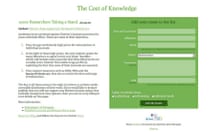Your editorial (An open and shut case, 11 April) offers a dangerously limited analysis of the successful role played by scientific publishers in the UK's research community. Far from being an "extraordinary racket", journals serve research communities, and publishers shoulder the administrative burden of filtering 3 million submissions to 20,000 journals, a colossal task of which the UK is a global hub. All of this needs funding, but the "direct grants" you allude to are far from universally available to research authors, especially outside the biomedical sciences. Instead, the system of subscriptions ensures that there is continuing investment in top-tier scientific journals, for which the UK has a global reputation.
The Wellcome Trust's eLife is something which all those involved in the current marketplace should welcome. Indeed, it mirrors a good deal of the innovation and experimentation which is already under way as publishers look to develop such "gold open access" models, alongside the subscription services which serve higher education well.
The marketplace is not, as you assert, in knowledge (which cannot be subject to copyright) but rather in the presentation and dissemination of research findings. The provision of top-quality, peer-reviewed publications, with high editorial standards which signal and amplify to the scientific community the best-quality research, needs a sustainable business model behind it. Everyone recognises that there may be more than one path to achieving this. The model proposed by the Wellcome Trust – to utilise some of its £14bn endowment – is one solution; the marketplace can and will sustain other solutions. We hope that the government's review of access to research outputs, known as the Finch group, will come up with some workable recommendations.
Richard Mollet
Chief executive, The Publishers Association
The current reader-pays system for publishing scientific articles may be silly, but not as silly as the alternative author-pays one suggested in your recent articles and editorial. As an independent scholar I will not be supporting the boycott of the traditional reader-pays journals. Had open-access journals been present in the past, Darwin would presumably have paid the large author fees out of his own private income, but Einstein, as a patents clerk in 1905, would never have been able to afford to publish his four ground-breaking papers, nor to find anyone to pay for him. One great advantage of independent research is the chance to do broad interdisciplinary research and the flexibility to change one's research area. I am considering preparing a review on concussion, and were I to get a grant for this, the grant body would no doubt pay for me to publish on this topic in open-access journals. However, I have published on other subjects, currently "dormant", but someone might suddenly take an interest in my work on autism or hallucinations. There is no way this topic would get paid for, so to publish on these I would have to pay out of my own pocket until the money ran out.
AG Gordon
London
Access to online sources in the National Library of Wales is not "on-site only" (Letters, 12 April). Readers who live in Wales enjoy online access from home to a wide range of information they'd otherwise have to pay for, and all our website users can take advantage of material, including journals, that the NLW has digitised. However, it is true that non-members of universities cannot easily read most online academic journals. The NLW is a member of Research Libraries UK, which has done much to change this by promoting open access for all.
Andrew Green
The librarian, National Library of Wales
While I agree with the majority of the letters you published in response to the Wellcome Trust's call for open access publishing, one point that has not been made is that authors of published papers do have the right to email electronic copies of their papers for scholarly purposes. It doesn't work for all papers, particularly ones published longer ago (10+ years), and it can be more time-consuming, but researchers routinely email each other for copies of papers they can't otherwise access.
Dr Kirsty Park
University of Stirling
For a working model of open, low-cost academic publishing (Government welcomes calls to open up science, 11 April), look at arxiv.org. Free to place articles, open for all to read, the minimal costs are covered directly by research funding agencies. Used for over 20 years in theoretical physics, readers decide what is worth a look, posterity decides what is good. Why pay for anything else?
Dr Tim Evans
Imperial College London
Your editorial contains a lot of striking misconceptions about the costs of scientific publishing. "Open access" does not mean free, as many readers may have assumed, with many costs involved including managing systems and content to name just one.
You also fail to mention the different open access models currently being considered by Research Councils UK that will have significantly different impacts on sustainability within the scientific, technical and medical publishing industry, which makes a massive contribution to the UK economy.
The Royal Society of Chemistry supports a move towards gold open access – a more sustainable model – and encourages funding to be made available to support authors during any transition from reader- to author-side payments. This model would remove the need for article repositories and publication costs are covered by article processing fees (APCs) paid by authors upon acceptance. The final article is immediately made available to all.
Models based on green open access, where a version of the paper (often the author's manuscript) is made available via a subject or institutional repository and an embargo period of six to 24 months often involved, are expensive to maintain, unsustainable, inherently complicated and should be avoided. No payment is made under green open access and publishers are expected to recoup their investment through traditional sales during the embargo period.
Under the RSC's "open science" model, authors are currently offered the option of paying a fee in exchange for making their accepted communication, research paper or review article openly available to all via the web.
We have sent our submission to RCUK's proposed policy on access to research outputs and look forward to receiving its findings.
Dr Robert Parker
Chief executive, Royal Society of Chemistry







